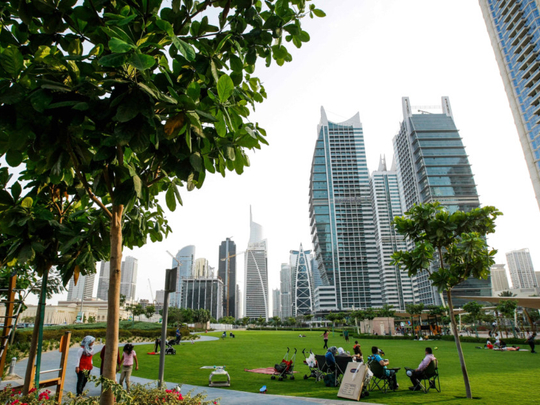
Dubai: Community managers have been given 30 days to identify crowded units in Jumeirah Lake Towers (JLT), a posh Dubai community.
The Dubai Multi Commodities Centre (DMCC) has issued a circular addressing the crowding issue and misuse of residential units in JLT.
The DMCC, a government entity, is responsible for the administration and management of the community.
The circular addressed to owners association managers stated that “a number of residential units across JLT are being improperly utilised as multiple occupancy units by employers located both within and outside the community to accommodate their employees”.
The circular did not define “overcrowding” but rules in other freehold Dubai communities state that only one person per 200 square feet is allowed to occupy an apartment — or a maximum of three tenants per studio, five per one-bedroom flat and seven in a two-bedroom apartment.
According to Dubai Municipality, the crowding of residential units under any circumstance is illegal and is in direct contravention of the health and safety rules and regulations.
“Such misuse and overcrowding represents a considerable fire hazard to those buildings and infringes the fire rules and regulations stipulated by Dubai Civil Defence (DCD),” said the circular.
The DMCC has also received complaints from JLT residents who said the “occurrences of overcrowding has resulted in significant disruption to the community”.
The reported incidences include various health and safety situations, and anti-social and unhygienic behaviour.
Gulf News talked to residents in JLT about their experiences with disturbances in the community.
A resident who asked to remain anonymous confirmed that crowding in apartments takes place in different clusters, as he once shared a three-bedroom apartment with eight people for a period of six months.
The resident pointed out the apartment was divided by partitions to create between six to eight small rooms, which were then rented out to individuals or partners. Some residents lived in the apartment for as short as one week, while others stayed there for months at a time and even as long as a year.
“The number of residents always fluctuated in the apartment, and there were lots of new faces every week. From what I know, these apartments belong to owners who might have agents managing them,” said the resident.
Another resident, J.R, is astounded that the flat next door has a new tenant every week.
“This is something I have raised with the management multiple times. I see new faces all the time, walking into the apartment and especially on weekends when they party till the early hours of the morning,” said J.R.
He pointed out that after reaching out to an agent to inquire about a flat in JLT for a friend, he was given the option of sharing units, as well as units that are rented out weekly and even daily.
The next step
To resolve this issue, the DMCC is formally requesting owners association managers to undertake a full investigation into the residential towers, and report back within 30 days from the issuing date of the circular on July 26.
The investigation should include details of every occupant in each unit, including unit number, occupant names, owner or tenant names, email addresses and telephone and mobile numbers.
They have also been requested to list the units suspected of crowding, along with the full contact details of owners and landlords of the identified units.
“In the event that you fail to submit the report to DMCC within the prescribed time frame, DMCC will have no choice but to consider imposing sanctions against you, which may include suspension of your DMCC trade licence and financial penalties, in accordance with DMCC Free Zone rules and regulation,” read the circular.








